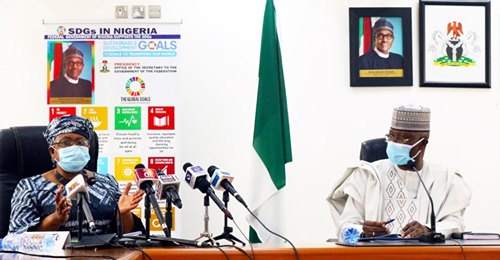
•Lauds Nigeria’s COVID-19 response
Director General of the World Trade Organisation (WTO), Dr. Ngozi Okonjo-Iweala, has promised that the body will work to reduce export restrictions among member states, especially with regards to medical supplies in the wake of COVID-19 pandemic.
She gave the assurance when she met with members of the Presidential Task Force on Coronavirus (COVID-19) pandemic at the Office of the Secretary to the Government of the Federation, Abuja.

The WTO DG, who said she was on a thank you visit to Nigeria and the ECOWAS for the support she received in the run up to her elections into the trade body, stressed that in a pandemic, an economy cannot be advanced until the health sector is taken care of.
She said: “The main reason we are here is really to see how the WTO can support Nigeria, in improving its economy. And part of doing that is the health. We are in a pandemic and of course, you cannot advance the economy until you take care of the health aspects. And so what the Secretary to the Government office is doing along with the presidential Task Force is laudable, and we wanted to just discuss with them, one, what is happening, the arrival of the COVID vaccines, how that is being distributed, the challenges, opportunities on the way of that and that the WTO can do.

“Interestingly, trade is very instrumental in access to medical supplies and equipment, because how do they get from one place to the other? It is through trade. And part of the challenges we’ve had in this pandemic is the fact that some of our member countries put export restrictions on the movement of medical supplies, equipment, and even supplies to make vaccines.
“So one of the things that WTO can do is to work with members to reduce these export restrictions. If you take vaccines, for instance, I’ll just give you one number from the manufacturer of Pfizer, the Pfizer BioTech vaccine. We had a meeting with the manufacturers a couple of days ago in Geneva and their representative said that it takes 280 components to manufacture their vaccine. And it’s in a supply chain that involves 19 countries. So in the supply chains, so many of our products, medical products are global. And so when a country puts export restrictions on one, it means that you slow the production everywhere, that’s where the WTO comes in. Because, we have certain rules that members should abide by, with respect to these restrictions. And we play a fundamental role in making sure that medical supplies and equipment and vaccines circulate.
“And you remember at the beginning of the pandemic, there are many countries, you know that blocked export. So we’ve managed to get that reduced. There were 91 countries at the beginning, who, had restrictions and prohibitions on on export of medical supplies and equipment. We are now down to 59. So we’ve reduced considerably but still too many my view. And so that’s one of the things we’re trying to get right.
“So we are here to see what we can do to support Nigeria. I have to personally say, I was chair of GAVI, the vaccine alliance for five years, one of those who designed the COVAX facility, and have been very proud of the ability to make available to poorer countries and to emerging markets like Nigeria, access to vaccines at affordable prices. So we will continue to push that. And we want to see what the challenges and opportunities are and how it’s going.
“Let me say I’m proud to now of what the progress that has been made. It sounds good. And I hope we can continue in that way.”
In his remarks, the SGF and Chairman of PTF, said the pandemic came with a lot of effects and impacts on the nation’s economy but provided an opportunity for the country to really go back and look at her systems.
He said: “The good thing about COVID-19 is that it has exposed the weaknesses of all systems. Even the most established democracies and economies have been brought to their knees by the adverse effects of COVID-19. But I think the developing economies stand to benefit if they learn from the lessons of this adverse impacts and look at their systems, their governance system, their economic foundations, and the need to heighten inclusion in the way we develop our agendas and our programmes.
Credit: The Sun
